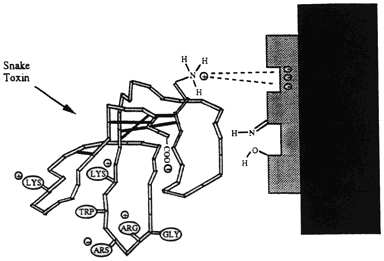Created by Susan Stagg-Williams, Dieter Andrew Schweiss, Gavin Sy, and H. Scott Fogler, 1994
Updated by Apeksha Bandi, Gustav Sandborgh, and Arthur Shih, 2013
Effects of Cobra Venom in Detail
Cobras have several methods for delivering their deadly venom to their prey.
Some cobras can spit their venom into a victim's eyes, causing extreme pain and blindness.
However, the most common and well known method of venom delivery is injection into a victim's body
through their bite.

Cobras belong to the sub-group of snakes known as elapids; there
are over 270 species of cobras and their relatives. An elapid's venom
contains postsynaptic neurotoxins that spread rapidly in its victim's
bloodstream, causing respiratory failure and, eventually, death.
Cobra venom is an example of a molecule that prohibits the interaction of
acetylcholine molecules (transmitted from nerve endings surrounding the diaphragm muscle)
with the receptor sites on the diaphragm muscle.
(See the section on Human Respiration for more details).
The venom disrupts the neuromuscular junctions involved in human respiration by reacting
with the receptor sites in place of the acetylcholine molecules, thus blocking the receptor sites.

Unlike the acetylcholine molecule; however, the venom molecule will not immediately react
with the alcohol group of the receptor site, and therefore, it will not brake down and vacate
the receptor site. The permanent interaction causes the channels of the receptor site to remain
open, and a draining of the electrical impulse occurs. When the impulse is drained, the muscle
fiber does not receive sufficient stimulation. Since the muscle response is an additive effect
created by multiple muscle fibers, only 85 to 90% of the receptor sites in the diaphragm need to be
blocked for cessation of the muscle function to occur. In this case, the victim usually dies within
30 minutes. The only way to save the life of a victim of a cobra bite is to inject the appropriate
antivenom shortly after the patient has been bitten or put him on an artificial respirator.